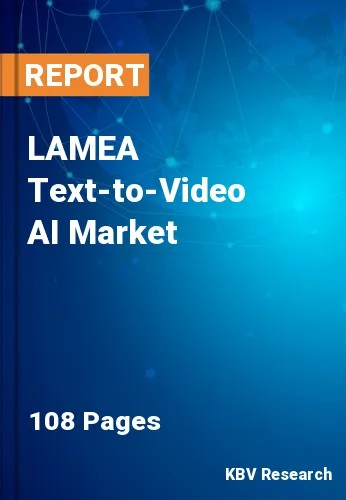The Latin America, Middle East and Africa Text-to-Video AI Market would witness market growth of 41.9% CAGR during the forecast period (2022-2028).
The majority of text-to-video AI is online video platforms that do not require a downloaded program. The user only needs to have access to web browser and internet connection. Text-based AI video platforms are often referred to as AI video-generating platforms. The user must enter a text screenplay, and the AI system will automatically generate the video. It can also add background music and music to a video. Nevertheless, custom visuals, audio, and voiceovers can be added to the slides. It is crucial to understand that AI algorithms are programmed to learn from every activity they perform; thus, if the user continues to employ the tool, a better output can be anticipated.
There are two primary sorts of videos, a regular video made from a text screenplay and a video created from a pre-recorded video. The AI creates a video by selecting photos and music. If desired, one may change it afterward. A video featuring an avatar of a human. Since technology has advanced, it is nearly impossible to distinguish between a real person and a computer-generated human avatar in these types of videos. The facial expressions and lip-syncing are refined and of superior quality.
The United Arab Emirates' e-commerce market is primarily driven by consumers' increasing preference for online shopping. This has encouraged suppliers for the global e-commerce business to invest in the nation. The e-commerce industry in the United Arab Emirates has grown significantly due to numerous causes. One of the main reasons for expanding its e-commerce is the increase in smartphone and internet usage. Numerous luxury brands have opened their websites in Arabic to draw in local consumers who have shied away from online purchasing due to language barriers. Compared to other markets with more robust e-commerce businesses, Saudi Arabia's digital infrastructure is expanding quickly. These aspects propelling the market growth.
The Brazil market dominated the LAMEA Text-to-Video AI Market by Country 2021, and would continue to be a dominant market till 2028; thereby, achieving a market value of $19,513.6 Thousands by 2028. The Argentina market is experiencing a CAGR of 42.6% during (2022 - 2028). Additionally, The UAE market would showcase a CAGR of 41.5% during (2022 - 2028).
Based on Component, the market is segmented into Software and Services. Based on End User, the market is segmented into Marketers, Social Media Managers, Educators & Course Creators, Content Creators, Corporate Professionals, and Others. Based on Vertical, the market is segmented into Education, Travel & Hospitality, Fashion & Beauty, Media & Entertainment, Retail & Ecommerce, Food & Beverages, Real Estate, and Others. Based on Deployment Type, the market is segmented into Cloud and On-premise. Based on Organization Size, the market is segmented into Large Enterprises and Small & Medium-Sized Enterprises. Based on countries, the market is segmented into Brazil, Argentina, UAE, Saudi Arabia, South Africa, Nigeria, and Rest of LAMEA.
Free Valuable Insights: The Worldwide Text-to-Video AI Market is Projected to reach USD 961.9 Million by 2028, at a CAGR of 36.3%
The market research report covers the analysis of key stake holders of the market. Key companies profiled in the report include Vimeo.com, Inc., Meta Platforms, Inc., De-Identification Ltd., Google LLC (Alphabet, Inc.), Synthesia Limited, Veed Limited, Movio, Yepic AI Limited, Animatron, Inc. (Wave.video), and Ezoic, Inc.
By Component
By End User
By Vertical
By Deployment Type
By Organization Size
By Country
Our team of dedicated experts can provide you with attractive expansion opportunities for your business.

